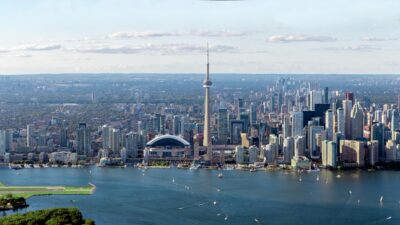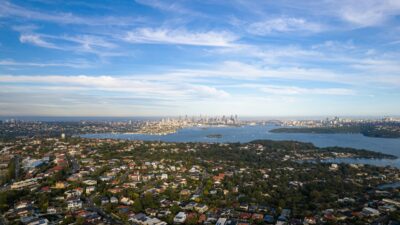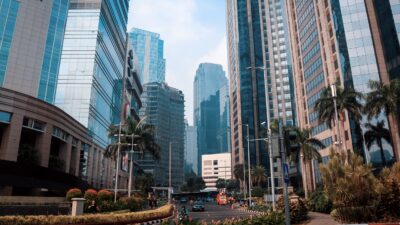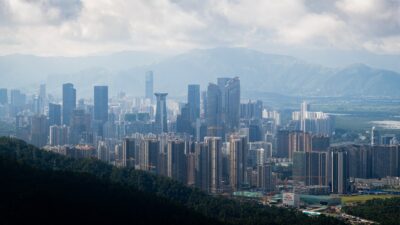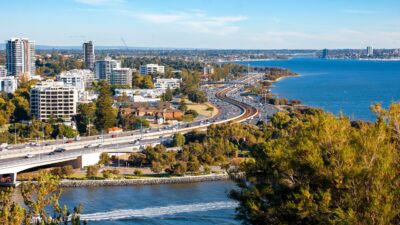Sandra Peter and Kai Riemer

The Future, This Week 14 Jun 19: #FlyingCars, #Mobility, #EVs
This week: flying cars, China pushes electric vehicles, and the future of the automobile. Sandra Peter (Sydney Business Insights) and Kai Riemer (Digital Disruption Research Group) meet once a week to put their own spin on news that is impacting the future of business in The Future, This Week.
The stories this week
00:45 – Flying cars are coming to Melbourne courtesy of Uber (Or are they?)
07:56 – Elon Musk is gonna take his Tesla to the Old Town Road (his pickup can have horses in the back)
10:48 – China is building up to 20 Electric Vehicle Detroit clones
Other stories we bring up
Uber Copter is no solution for NYC’s congestion problem
Flying drone taxis are making only slow progress in Dubai
China bars cities from restricting Electric Vehicle car registrations
BMW and JLR announce electric vehicle innovation partnership
Our previous discussion of BYD electric buses in China
Our previous discussion of Tesla’ patents free for anyone and any company to use
Norway will be forced to spend big bucks on its electric grid due to love of EVs
You can subscribe to this podcast on iTunes , Spotify , Soundcloud, Stitcher, Libsyn, YouTube or wherever you get your podcasts. You can follow us online on Flipboard, Twitter, or on sbi.sydney.edu.au.
Our theme music was composed and played by Linsey Pollak.
Send us your news ideas to sbi@sydney.edu.au.
Dr Sandra Peter is the Director of Sydney Executive Plus at the University of Sydney Business School. Her research and practice focuses on engaging with the future in productive ways, and the impact of emerging technologies on business and society.
Kai Riemer is Professor of Information Technology and Organisation, and Director of Sydney Executive Plus at the University of Sydney Business School. Kai's research interest is in Disruptive Technologies, Enterprise Social Media, Virtual Work, Collaborative Technologies and the Philosophy of Technology.
Share
We believe in open and honest access to knowledge. We use a Creative Commons Attribution NoDerivatives licence for our articles and podcasts, so you can republish them for free, online or in print.
Transcript
This transcript is the product of an artificial intelligence - human collaboration. Any mistakes are the human's fault. (Just saying. Accurately yours, AI)
Disclaimer We'd like to advise that the following program may contain real news, occasional philosophy and ideas that may offend some listeners.
Intro This is The Future, This Week on Sydney Business Insights. I'm Sandra Peter, and I'm Kai Riemer. Every week we get together and look at the news of the week. We discuss technology, the future of business, the weird and the wonderful, and things that change the world. Okay, let's start. Let's start!
Kai Today on The Future This Week: flying cars, China pushes electric vehicles, and the future of the automobile.
Sandra I'm Sandra Peter, I'm the Director of Sydney Business Insights.
Kai I'm Kai Riemer, professor at the Business School and leader of the Digital Disruption Research Group. So Sandra, what happened in the future this week?
Sandra Well flying taxis seemed to happen, well not yet actually.
Kai Literally in the future.
Sandra Next year, not next week. Melbourne will be the first city outside of the US where Uber will have trials of its Uber Air service. So imagine aerial ridesharing, same thing as Uber but with helicopters or other drone-like devices that will move people from rooftop to rooftop. Apparently for the price of an Uber X.
Kai Well probably initially, to get things off the ground. They call these rooftop landing spots 'sky ports', and the whole thing 'electrical vertical take-off vehicles'. So they're like little helicopters without a pilot, and without a petrol-guzzling engine, so they're electric vehicles. And they also do not exist yet. So we do have CGI rendered images of what these things might look like. They look pretty futuristic, but apparently the company is determined to start test flights next year, and then commercial operations in 2023.
Sandra So we're doing this story mainly because Megan, who's our sound editor, has been wanting us to do flying cars on the podcast about the future for a very long time. So finally, we're talking about kind of flying cars. Although to be fair, they're probably going to end up being just regular helicopters, or electric helicopters to begin with. And that they won't be able to carry more than what an actual Uber X could carry, which is about four, maybe five people. And they will apparently cut down the 19 kilometre journey from Melbourne's CBD to the airport to about 10 minutes. Well this is about 25 minutes if you're in regular traffic, or probably about an hour if the traffic is bad.
Kai I've had a 90 minute trip once, so it can get quite bad if you have, which in my instance was, a Friday night, rainy day, congested peak hour traffic. So supposedly this could be a good idea to get to the airport quickly, but we need to point out that at this point in time this is a press announcement, and not much more. Which might be a company that is coming off a rather lacklustre IPO, generating news stories about the future. But certainly the Victorian government spokesman, the Treasurer Tim Pallas, was quite excited and he put out the following statement: "Victorians have a can-do attitude and we hope Uber air will give us the altitude to match it. I'm Uber excited."
Sandra Well I'm Uber sceptical about some of the claims that have been made. Let's just start with the fact that the Uber spokesman pointed out that this has the potential to reduce traffic congestion which costs the Australian economy 16.5 billion dollars a year. I doubt that a few flying taxis will do much to reduce that congestion. And speaking of that congestion, once you move it from the ground to the air, it's not like you're reducing it, you're just moving it. Like the traffic in Sydney from George Street to Elizabeth Street.
Kai But also the argument made in the article that having driverless drones in the air is easier than driverless cars, because there's less obstacles and less pedestrians in the street, only holds as long as there's only a couple of those drones about. The moment they're going to scale this, we're running into the same kind of problems, and now at 360 degrees around the vehicle, you know, more opportunity to collide with things once a lot of these drones are in the air. These are all problems that are technically completely unsolved as yet.
Sandra So looking up where this is going next. Haven't we seen some of this initiatives before?
Kai Well there's been an initiative in Dubai where they started trialling drone taxis, but that was a while back, and the latest news we could find was actually that testing is ongoing. A press release from February this year, so they're still working on it. But there's also, and that's another story from this week, Uber Copter which is a service that will actually exist in New York City claiming to solve the same problem getting people from Wall Street pretty much, downtown Manhattan, to JFK Airport.
Sandra So this is CityLab reporting on helicopters that will go from New York City to JFK. And this is traditional helicopter, not even the nice CGI sky taxis we've seen in the Uber Air Melbourne affair.
Kai And the article makes the point that these are "conventional twin-engined gas-fueled choppers, the type that emit more CO2 emissions than cars that do to cover the same distance and pound out a hundred throbbing decibels of noise pollution in the process".
Sandra That's what the article says, which the World Health Organization also deemed a leading environmental nuisance. Also this thing seemed to crash, there was one earlier this month that went down into the Hudson River.
Kai To be fair, this was a helicopter of the startup Blade, which is a competing product to Uber Copter. So this service is purely about getting people to the airport, whereas the idea for Uber Air, such as in Melbourne, will be a point to point service where people can actually go from rooftop to rooftop to different destinations around the city. And the article goes on to making a broader argument about whether or not this might help congestion which is rampant in New York, and especially the drive to the airport apparently is quite a nightmare.
Sandra But we should again point out the fact that these helicopters, just like the solutions that we will have in Melbourne, or any other type of aerial ridesharing, still at this point carry about the same number of passengers as a normal car.
Kai And it doesn't scale, and it is quite an exclusive product because in order to be able to use it, one has to be a Platinum or Diamond Uber rewards user, which means to spend at least 1250 or in the case of Diamond, 3750 dollars on Uber X rides in a six month period to be able to then take a 250 dollar helicopter ride to the app.
Sandra I'll let you know what it's like.
Kai So in that respect, these initiatives are not solutions but mere distractions to the real problem. But it's quite understandable why we talk about these things. Because when it comes to solving what are rather boring problems like congestion, it is much more sexy and it plays better in the media to go to, you know, flying cars, and drones, and the latest technology that everyone is enthralled with. And who wouldn't want to ride like in the movies? When building a train line to the airport is a rather boring affair, and you can't actually make many friends with this, and it takes a long time, and supposedly bringing in self-driving cars is much, much easier because you don't need much infrastructure, you don't need to lay train tracks, so it seems like a quick fix to what is a rather complicated problem.
Sandra And we're going to stay with the mobility theme for the whole podcast today, looking at various angles of that. But speaking of complicated, Tesla's shareholder meeting, and big news from Elon Musk. Our second article comes from The Verge.
Kai It's titled "The biggest news from Elon Musk's Tesla shareholder meeting" and the by-line reads: "Gonna take my Tesla to the old town road...".
Audio MUSIC AND LYRICS of Old Town Road
Sandra The article goes on to say that surprisingly horses were one of the themes at Tesla's annual shareholder meeting.
Kai So after Elon Musk suggested that owning a gas car would be the equivalent of using a horse to get around, one of the shareholders asked him if the company's announced pickup could actually haul her horse around, to which Musk replied:
Audio I didn't mean to insult horses earlier by the way.
Sandra And yes the planned pick up could haul her horse, in which case she would literally have horses in the back, right?
Audio MUSIC AND LYRICS of Old Town Road
Sandra And it's supposed to cost less than 50000 dollars. Musk has expressed his love for this pickup truck saying "I think it's the coolest car I've ever seen, to be frank".
Kai But we've heard this before, right, the Model 3 was supposed to only cost 35000 dollars but that cheapest version has since been scrapped. And so there was a whole discussion around: is there a demand problem? To which Musk brusquely said no, "Absolutely not". But he acknowledged that there might be an affordability problem, because the cheapest Tesla is still more than the average car price in the US.
Sandra And let's not forget the company did suffer one of its worst quarterly losses ever, so this is the background to this annual shareholder meeting.
Kai But the more interesting news come around where the market as such is going. Because Tesla is somewhat of a canary in the coal mine, when it comes to the electric vehicle industry. It's certainly not the one selling the most cars, for that we will have to look to China, and we will in a minute. But Tesla is really important. And so the industry needs Tesla to do well. And one of the biggest problems that they outlined was that currently lithium is quite a rare material, which is the basis for making the batteries that go into the Tesla cars and all other electric vehicles. And so Tesla actually alluded to the fact that they might get into mining to secure its own deposits of lithium, which ties in with the vision of Elon Musk Gigafactory which is supposed to do everything from processing raw materials such as lithium, to building the cars. So the entire production chain in one big complex or building.
Sandra And speaking of building big complexes, I think this is the point where we want to take this to where the real story is. And I want to bring up an article from Bloomberg this week titled "China has whole towns focused entirely on making electric cars". So if you think about what Elon Musk is trying to do, now imagine that at scale. Imagine versions of Detroit under construction in China, and imagine about 20 of those, and they're all focused on electric vehicles.
Kai So called EV towns, or New Energy Vehicle Towns, these are greenfield developments that happen all around China, where municipalities try to entice the emerging electric vehicle, autonomous vehicle, battery industry to set up camp in their neighbourhoods. And it comes with tax breaks, it comes with first class infrastructure, public transport, subsidies for workers to buy houses, to really get this industry going, and get it going at scale. Whereas Tesla is in the media, and as we said it's an important benchmark for how the industry might be going, the real shit really goes down in China, because it happens at scale.
Sandra So President Xi Jinping actually envisions that China's 500 electric car makers will actually bring into these cities a whole host of other industries that will flourish around the production of electric vehicles.
Kai And the government has made available up to 30 billion dollars US in development money to these emerging cities to build the infrastructure necessary to erect industrial parks, apartment buildings, schools, and so and so forth.
Sandra And this is about as much as China has spent over the last eight years, so the government has already spent more than 35 billion dollars subsidising electric vehicle sales.
Kai And it turns out the Chinese government is actually doing more than that, and that lines up with an article in Quartz titled "China's hit upon the best way to boost sales of electric cars - but it'll hurt fossil-fuel ones". So this is an interesting article from which I personally learned a lot of things that I didn't know about China. For example, in many large Chinese cities such as Beijing, it is actually very hard to become a car owner. So firstly there's a lottery for petrol cars. If you want to register a car, and the chances of being allowed to register a car in any given year is about .05 percent, so there's an actual lottery. So it's very hard to become a car owner, because of the way in which the cities are so gridlocked, the government only allows very few new cars into those cities. And the way in which China now operates is that they're going to change the quotas for petrol and what is called NEVs, new energy vehicles, to favour electric cars, essentially. So in 2019 they're going to allow 60000 of the new energy vehicles, and only 40000 petrol cars. So what the government is doing is it's changing those quotas favouring electric vehicles therefore boosting that industry, but in the process basically moving slowly out of petrol ones.
Sandra And just to stress how big this change is, currently the waiting time for a new electric vehicle in Beijing is approximately eight years, according to Bloomberg.
Kai Which the national government is trying to reduce by forcing cities not to have those restrictions on electric vehicles.
Sandra So starting June 6 local governments in China can no longer issue restrictions on the purchase of new energy vehicles, nor limit the times when they can be on the road, which was one of the other ways that China controlled the number of cars in circulation, to try to keep congestion and pollution down. And in cities where such restrictions already exist there are plans in place to have them phased out.
Kai And obviously the Government is considering here both gridlock, of course new energy vehicles still contribute to congestion, but also pollution, right, which those vehicles will have a positive effect on. And indeed, in a recent study where 332 consumers who visited one of the government-backed electric car promotion centres were asked why they were considering such a vehicle, 43 percent of people ranked the availability of licences as their primary reason.
Sandra But there was something else really interesting in this article which was the fact that the article mentions that China's automotive industry does seem to be in trouble. So there has been a steady slowdown in the growth of new car purchases, and last year was the first year in 30 years that there were actually less new car sales than the year before, which is a really big thing considering the growth that we've seen in China across the board.
Kai So while the government is pushing electric vehicles through initiatives such as the EV cities, and getting rid of restrictions, and increasing quotas for cars in cities, the overall car industry in China, and indeed worldwide, seems to be in trouble.
Sandra And Bloomberg calculated that even if China were to let go of all of the purchase restrictions on electric cars, that wouldn't be enough to revive the auto market. In January there was an increase of about 140 percent in the sale of electric vehicles, but still overall car sales were in decline by almost 16 percent. And electric vehicles, let's remember, in China only account for about 4 percent of the total car sales.
Kai Which brings us to another article from this week, this one in Wired UK reporting on BMW and Jaguar Land Rover announcing a collaboration around their electric vehicle development. In this article the author describes that the automotive industry is facing a 'perfect storm'. In the UK, car sales has declined by six point nine percent, in China as we said two point eight percent, diesel cars have a very bad reputation of the diesel scandals, and car owners are facing restrictions, not being able to enter certain city centres across Europe, because of emissions restrictions.
Sandra And also let's remember we have seen things like supply issues with cars like the Tesla, there is an overall decline in consumer confidence across Europe. There are things like the Brexit fear. There are also imports actually from very cheap car manufacturers in China, and there are also consumer preferences, quite a few people in Europe as well, take Uber or take Lyft, rather than buy their own car they use ridesharing services.
Kai And then of course there's the move to alternative energy solutions such as hybrid, hydrogen, or indeed, electric cars. So taken together, this has actually led the industry to come up with some seemingly radical solutions. Famously Elon Musk announced that Tesla is going to give away all its patents, making essentially its technology open to the entire industry.
Sandra And now this completely unusual move from two companies that would be clear competitors, Jaguar Land Rover and BMW, to announce that they will work together to develop electric vehicle technology, thus hoping to really speed up the innovation that happens in that space, and spread the costs of developing these new technologies across the two companies, and try to grow the industry as a whole, rather than compete against each other.
Kai This is indeed significant because both companies are considered leaders in alternative drivetrain technology, BMW with its i Range, the i3 is a leader in hybrid technology, much like Toyota is. And Jaguar is making waves with its I-PACE electric vehicle, which directly competes with Tesla for mileage technology, and also appeal to the same kind of customers. So while these companies might be competitors, the move is really one of joining forces to make this technology work.
Sandra So there's two ways you could look at this. On the one hand you could consider it the 'perfect storm', the declining car sales, the loss in consumer confidence, the increasing consumer interest in ridesharing companies, and so on. So a car industry hit with serious demand concerns, and increasingly, financial difficulties.
Kai Which would make this a defensive move, right, two competitors joining forces to share costs, to rationalise, and therefore to set competition aside, to basically weather this storm, right?
Sandra Or a perfect coming together of factors that would allow, finally, the electric vehicle movement to take form, spreading not just through innovation, or through efforts by single companies, but throughout an industry now having a concerted effort supported by government as well to try to change the way we drive.
Kai So on this view we would say the car manufacturers actually realising that the industry as such needs to go through a bigger transformation. And so they start looking at it from a systems level, and trying to do things that promote growing electric vehicles as a market as such. For two reasons because first of all, doing this transition in a competitive environment is too hard for each individual company, so at some point industries often join forces to actually bring the industry forward. To then, in the second step, would bring out these competitive forces again. But also, in my personal view, the move to electric vehicles has to be made quickly in order to keep consumers interested in individual car ownership. Because there's so many movements now from Uber, Lyft, and alternative modes of transport, changing preferences, millennials not inclined to even have a driver's licence, that the industry is really up against alternatives to individual car ownership. So the quicker the industry can make the transition to electric vehicles, the quicker people will hold onto individual car ownership, and then replace petrol cars with electric vehicles.
Sandra See, to me this is a question of whether it really is a moment of transformation for an industry, or really a struggle to stay in the game. So I think there are a number of other things that come into play, we often tend to look at the car companies themselves, and what they're doing to take our cues. But if you look at this at the more systemic level, there are a number of things that still work against these sort of moves. One is, as you said, consumer preferences, that people just do not want to own a car. Hence, it's not clear what the business models around selling these cars or financing these cars will be in the future. The second there's one that was foreshadowed in our story with Elon Musk, who said that the big problem is now access to batteries. That was also present in the BMW, Jaguar Land Rover debate, where they said that the supply for batteries is extremely limited and they couldn't see a way in which, for the next two or three years, there would be a reduction in that cost. Which means that the cars are not going to get any cheaper. If anything, the cost of those batteries might go up. In which case the accessibility of these cars is still an issue. And let's not forget, neither Jaguar Land Rover nor BMW make the cheapest of cars, nor does Tesla. So that's still an issue. And then there are issues around the grid that would support this. So to me it's not just about access points of where you charge these cars, right, and this is something that no European country has really grappled with. But in places where we've seen a good spread of electric vehicles, in places like Norway the National Grid is really struggling to keep up with the demand that's now being put on it by this onslaught of electric vehicles. I think there are quite a few challenges ahead for this to be a true industry transformation.
Kai So the future of the automobile, the future of the car industry, or of the mobility industry, it's very hard to actually now figure out what is the industry, right? Which is a typical disruption phenomenon, when it is not quite clear where to draw the boundary. Because if we step back from this, we have drones, and flying cars, and self-driving cars, there's heaps of startups, there's companies subsidising pushing agendas.
Sandra There is the light rail in the CBD.
Kai There's the light rail, which in Sydney is a little bit of a sad story at the moment. There is, and we have featured this on the podcast previously, electric buses in China. A really big deal, to the extent that, and that was the previous story, a measurable effect on the oil industry was present.
Sandra And we'll put the link in the shownotes.
Kai So with all of these things happening at once, and many of those having an uncertain future, flying cars self-driving vehicles, batteries facing lithium shortages, it'd be really interesting to see what the future of this industry will look like.
Sandra But this is where we have to leave you for today, and actually this is where our regular season ends.
Kai So this was Season 5 of The Future, This Week.
Sandra We'll be back with Season 6 in August. But before then we will come back to you very shortly with a wrap-up of our event at Vivid, and a couple of very special episodes that we will have over the Australian winter and the European summer.
Kai So we're not at this point saying see you next week, but see you next season.
Sandra On The Future, This Week.
Kai Yeah, but not next week but, you know, in August.
Sandra Thanks for listening.
Kai Thanks for listening.
Outro This was The Future, This Week, made possible by the Sydney Business Insights team and members of the Digital Disruption Research Group. And every week right here with us, our sound editor Megan Wedge who makes us sound good, and keeps us honest. Our theme music was composed and played live on a set of garden hoses by Linsey Pollak. You can subscribe to this podcast on iTunes, Stitcher, Spotify, YouTube, Soundcloud, or wherever you get your podcasts. You can follow us online on Flipboard, Twitter, or sbi.sydney.edu.au. If you have any news that you want us to discuss, please send them to sbi@sydney.edu.au.
Close transcript

